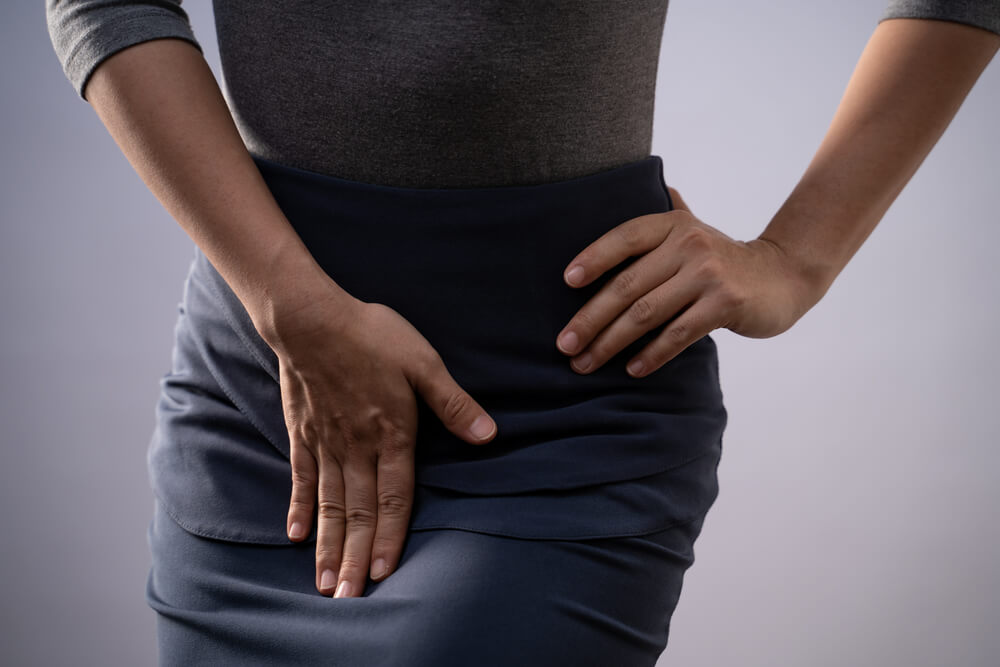Lichen simplex chronicus is a skin condition in which leathery skin can appear on the neck, arms, and around the genitals and, without proper care, can lead to long-term skin inflammation caused by scratching. However, with adequate treatment that includes topical steroids, ointments, or in some cases, phototherapy or cryosurgery, this itchy, thick layer of skin will go away. With that being said, let’s dig a bit deeper into what causes LSC and how we can properly get rid of it.
What is Lichen simplex chronicus?
Lichen simplex chronicus is an irritation of an accessible skin area caused by chronic scratching. It is an inflammation that makes you rub and scratch the itchy area, causing it to change in texture, swell and become darker, making it stand out from your usual tone.
As the area becomes more inflamed, it can lead to further scratching and irritation, throwing you into an annoying “itching-and-scratching” cycle that can only worsen the problem long-term.
Most frequently, this condition is diagnosed among adult women between the ages of 30-50 and appears around the vulva. Still, it is essential to know that vulvar lichen simplex chronicus cannot be transmitted to another person because it is not caused by bacteria or fungi and therefore is not considered a sexually transmitted disease.

What causes Lichen simplex chronicus?
Although it is hard to identify a single culprit behind the cause of lichen simplex chronicus, current research indicates that the causes of this scaly skin condition come from both emotional and environmental factors.
Studies suggest that psychological disorders such as anxiety, depression, or obsessive-compulsive disorder can physically manifest as itching on the parts of our body to distract us from our thoughts, which we often scratch without much notice or when we are asleep. Many external factors and contact irritants such as dry air, heat, sweat, detergents, and other scented products can also cause this itchy, leathery skin to form on certain parts of our body.
Products and things that can irritate the skin and cause it to itch include:
- Hygiene sprays, perfumes, powders
- Soaps, gels, lotions
- Deodorant tampons and pads
- Laundry detergents and whiteners
- Dryer sheets and fabric softeners
- Prepackaged condoms with lubricant or spermicide
- Toiler paper that is colored, perfumed or has Aloe
- Nylon and synthetic underwear
It is important to note that having lichen simplex chronicus does not mean you are necessarily allergic to these above products.
What are the signs of Lichen simplex chronicus, and how is it diagnosed?
Typical signs of vulvar lichen simplex chronicus are mild or severe itching or burning, thickened or swelling skin, tears in the skin, and leathery skin texture of different colors. A dampness coming from the outer vulvar skin can also be experienced, and it is important not to confuse it with vaginal discharge, which in this case, is not the cause of dampness.
The condition appears as a yellow, purple, or brown patch that can vary in size and is produced in the form of thicker skin by our bodies to protect the skin from further damage from scratching.
To diagnose it, you should go to your local health provider so that they can look for common skin changes on the vulva. Additionally, they might ask about your family’s medical history and check your vaginal discharge just in case to rule out an infection. Also, a small skin sample may be taken for a test and microscopically analyzed. If you have any questions but are not sure who you should turn to, do not hesitate to contact our Sexual Health Specialist In Miami.
How is Lichen simplex chronicus treated, and is there a way to prevent it?
There are plenty of ways to get this annoying leathery skin out of your way. Lichen simplex chronicus treatment consists of applying topical steroids and ointments on the irritated part of the skin. Salicylic acid can also be prescribed, as thin layers of these ointments and acids can reduce redness, swelling, itching, and burning sensations. Soaks of baking soda also help, and Gold Bond or Zeasorb powder can be applied if you experience chronic moisture/dampness problems.
Be advised, however, that overuse of these ointments and powders could make the problem worse, so make sure you use the products as prescribed by a medical expert. Also, weight loss is considered beneficial for this condition as it can help decrease moisture build-up within skin folds.
In some cases where the inflammation appears because of an allergic reaction, an antihistamine is used to control the reaction. A doctor would advise you to completely cease or at least find a way to reduce the exposure of your skin to the allergen.
Moreover, some psychological disorders that cause stress can boost the itching sensation, so make sure you consult with a mental health professional on how to reduce the levels of emotional stress, anxiety, and depression to prevent the further development of the itching sensation. You can also cover the itchy part of the skin with a thick, more comfortable piece of clothing, so it prevents you from scratching it harder.
In rare cases, lichen simplex chronicus treatment requires cryosurgery (applying extreme cold to remove the lichenified skin) or prescribed medications (tacrolimus). In even rarer cases, lichen simplex can lead to skin cancer or highly treatable cancers of the oral cavity, genitals, or feet, which would then call for long-term, more serious monitoring of the affected area.

How is lichen simplex chronicus prevented?
Overall, the best way to prevent lichen simplex chronicus is to maintain good hygiene and avoid itching. Even if the condition appears, lichen simplex chronicus treatment is nothing too dramatic to be worried about. If your skin feels itchy, appears inflamed or scaly, or has color changes, it is important to seek out an appointment with a physician specializing in skin conditions. If these symptoms are occurring on parts of the vulva or vagina, it is best to make an appointment with an OBGYN for further evaluation.
Our professionals at New Age Women’s Health will be more than happy to answer any of your questions about Lichen simplex chronicus and other health concerns, so do not hesitate to contact us!


